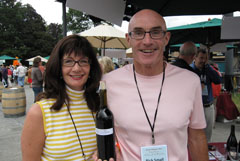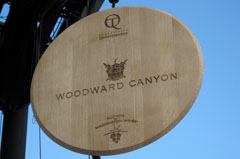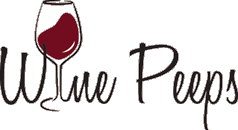Women of Washington Wine: Darcey Fugman-Small of Woodward Canyon
By Kori ~ October 25th, 2010.
Today’s post is part of a series featuring the Women of Washington Wine. In an industry once dominated by men, more and more women are joining the ranks as winery owners, vineyard owners, and winemakers. Being a woman myself, I am fascinated by these women and what they have done and continue to do. Through this series, I hope to introduce you to some of the brightest female faces in the Washington wine industry.
 Darcey Fugman-Small and her husband Rick Small founded Woodward Canyon Winery in 1981. Located in Lowden, Washington, about 13 miles west of Walla Walla, Woodward Canyon was the second modern-era winery in the Walla Walla Valley. Both Darcey and Rick are actively involved in the winery, Darcey as General Manager and Rick as Director of Production. Pioneers in the wine industry in the Valley, the Smalls were instrumental in the establishment of the Walla Walla Valley AVA in 1984. Darcey was also involved in the establishment of the Walla Walla Valley Wine Alliance in 2001 and is the only original board member still serving. Woodward Canyon produces 17,000 cases per year. The Smalls also own their own 42-acre Woodward Canyon Estate Vineyard in the Walla Walla Valley and are partners in Champoux Vineyards in the Horse Heaven Hills.
Darcey Fugman-Small and her husband Rick Small founded Woodward Canyon Winery in 1981. Located in Lowden, Washington, about 13 miles west of Walla Walla, Woodward Canyon was the second modern-era winery in the Walla Walla Valley. Both Darcey and Rick are actively involved in the winery, Darcey as General Manager and Rick as Director of Production. Pioneers in the wine industry in the Valley, the Smalls were instrumental in the establishment of the Walla Walla Valley AVA in 1984. Darcey was also involved in the establishment of the Walla Walla Valley Wine Alliance in 2001 and is the only original board member still serving. Woodward Canyon produces 17,000 cases per year. The Smalls also own their own 42-acre Woodward Canyon Estate Vineyard in the Walla Walla Valley and are partners in Champoux Vineyards in the Horse Heaven Hills.
Recently, Darcey was kind enough to take time out of her busy schedule to answer some questions for me and our Wine Peeps readers.
Highlights from Q&A with Darcey Fugman-Small:
How did you first get involved in the wine business?
Rick was already making homemade wine and had planted the first few rows of grapes when I met him in 1979. In fact, our second date was bottling his homemade chardonnay, so I guess that was my first foray into the business. Prior to that I had been exposed to wines by my parents and, of course, consumed some in college, but that was the extent of my experience. He had plans to start a winery even then. We were married in 1980 and founded the winery in 1981 in partnership with his parents who we later bought out.
What were the steps that led to where you are now?
Just slow, constant growth to a point where we feel that we are at the right size to maintain quality and control the brand.
In the early days, my involvement was limited to helping a bit during crush and bottling, working in the vineyard on weekends and being at some tastings and dinners as I had another full-time job as a land use planner for the County. I spent 22 years with the County going from Planning Assistant to Director, and then left in 2000 to come to the winery as General Manager. I had learned a lot about the winery over the years and knew how to manage a budget, staff, and projects through my work at the County so the transition was not too difficult even though I had to essentially create the position. My beginning here was about the same time as the explosion of information and communication demands due to email and the Web, so getting that under control was one of my first priorities. We had also recently opened our new tasting room, which brought an increased retail presence and required additional employees.
My original plan was to work about 3 days a week, which soon went out the window. As the business has changed, so have the duties of my position. We have a great team which will hopefully allow me to begin to pull back a bit from the day to day tasks in order to be able to spend more time looking at the business from a strategic point of view. Sometimes it’s too easy to get so involved with the minutiae that the big picture gets ignored.
Has being a woman been an advantage or a disadvantage in your wine journey?
I don’t know. My previous career in planning was also a male dominated sector, so it is an arena that I am comfortable in and don’t think about a lot. Not to generalize too much, but women are often more observant and perceptive which may give us an edge in the sales/customer relations end of the business. In the cellar, that perception can lead to a strong set of sensory skills.
Are there more opportunities available to women today in the wine business than when you started?
I have never perceived the wine industry to be discriminatory to women and have known women in both the production and business side of the industry since the beginning. Albeit, there are more women now in production and viticulture and as active owners than there were when we started. I think a woman can have a role wherever she wants in the industry if she is willing to work hard and knows her stuff.
 What advice do you have for a woman wanting to get involved in the wine business today?
What advice do you have for a woman wanting to get involved in the wine business today?
Try it out. There are many opportunities for internships, education, volunteering for organizations, etc., to discover all of the various possible positions in the industry. The wine industry tends to be a very supportive industry as a whole, and I think most of the women in the industry are particularly so which would make it fairly easy to find a mentor. Go to tastings, read traditional wine media and new media, travel, learn about food, take classes. There are now positions in the industry that did not exist 10 years ago. The wine world is very large so don’t limit the possibilities.
What are your thoughts about the Washington wine industry, in general?
It is a very exciting place to be. We are so young relative to the rest of the wine world. When you get outside of the Northwest, you realize how little awareness of Washington wine there really is. Even with the strong competition from around the world (which we need to be very aware of), we do have a compelling story and a lot of opportunity.
In recent years the Washington wine industry has grown at a rapid rate. Do you expect that trend to continue?
Yes, but probably not at the frenetic pace of 3 or 4 years ago. There will likely be some shakeout due to the economy and the fact that some people got into the business with unrealistic expectations or no understanding of the amount of work involved in selling the product (assuming that you have a good product). Establishing a vineyard and/or winery in Washington is still a bargain though when compared to doing so in the better-known appellations in California, so growth here will continue. And, of course, there is the romance of the business.
I understand that you were involved in preparing the original petition for the Walla Walla Valley AVA. Could you share a bit about that experience and your involvement?
With my background in planning, I was pretty well equipped to put the application and map together, to write the legal description, and to deal with the federal process. Becky Hendricks, who was then an owner in the original Seven Hills Vineyard, gathered the information on the Oregon side of the appellation, and I took on the Washington side.
That experience led me to become involved in the establishment of the Walla Walla Valley Wine Alliance in 2001, where I am the only original Board member still serving.
How do you and your husband, Rick, divide the duties at the winery?
Rick is involved in the production side of the business, which includes winemaking and vineyards, as well as some trade/sales activity; whereas, I am involved in the retail/consumer relations/charitable giving/event/marketing side. He manages the production/distributor sales staff and I manage the retail/hospitality/marketing staff. When people ask, I tell them that I herd cats. Rick and I cross over and make major business decisions together.
What is your vision for the future of Woodward Canyon Winery?
We want to continue to strive to make better wines, both in the vineyard and in the winery. We are not going to take anything for granted and will work hard to keep up with all of the changes in the industry, be they new media or sales models.
Sustainability and fostering a sense of place will become more significant. We grow produce for our staff, local restaurants, and to do events. That tie-in between the generational land and what foods it can produce, along with the wine grown there, and the fact that we prepare most meals here ourselves, is something that we will emphasize more.
Our daughter is running the lab at Long Shadows, and our son is a cook at Luc in Seattle, so their interests at this point in time are in sync with where we see the winery headed. We will be looking at how that may occur over the next several years.
Feel free to share any other thoughts that you believe would be of interest to our readers.
This is a great business and there is a very nice lifestyle that goes along with it, but “business†is the key word. While grape growing and winemaking may seem glamorous or romantic, it is really farming, making a product, and selling that product. To be successful, you have to be quick on your feet and work hard. And, it helps to love what you do and to enjoy sharing it, which I do.
—
Many thanks to Darcey for sharing her story and thoughts with us. I wish her and Rick all the best and will continue following their work and Woodward Canyon Winery with great interest, and I hope that you will too.
Filed under: American Wine, Interview, Washington State Wine, Women of Washington Wine

 Wine Peeps is an independent wine blog dedicated to helping you get the most bang for your buck in wine. We do this through blind tastings of wine from around the world and calculations of
Wine Peeps is an independent wine blog dedicated to helping you get the most bang for your buck in wine. We do this through blind tastings of wine from around the world and calculations of 











Great interview with Darcey! She is awesome!!
This is a fascinating interview. Darcey seems like a really smart, together person. I was glad to read that she does not think that the wine industry is particularly sexist. Great interview!
Rob and Stevie,
Glad you enjoyed this interview. Darcey is a very intelligent woman and, along with Rick, has been a real pioneer in the Washington wine industry. Cheers!
[…] Women of Washington Wine: Darcey Fugman-Small of Woodward Canyon was originally posted on Wine Peeps on Mon, 25 Oct 2010 14:00 UTC. Wine Peeps – Your link to great QPR wines from Washington State and beyond. […]
[…] have visited with Rick and Darcey at events and tasted some of their previous vintages. I have interviewed Darcey for our Women of Washington Wine series and Rick for articles about Champoux Vineyards and Sagemoor Vineyards. Whether on the phone or in […]